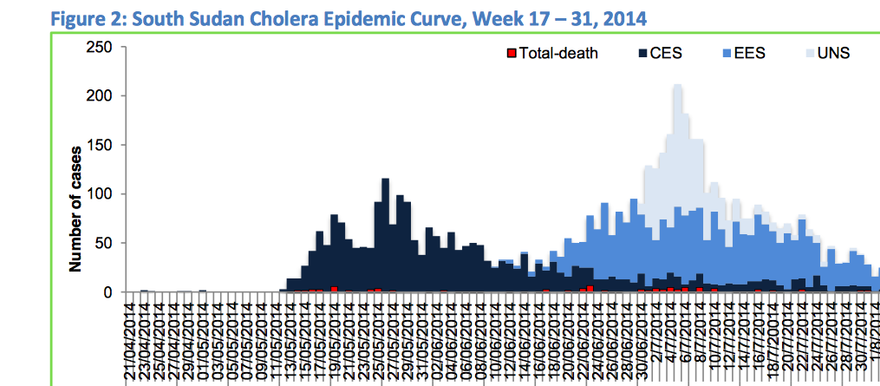The UN Children’s Agency (UNICEF) reported this week that health workers have succeeded in slowing down the outbreak of the deadly disease cholera in Wau Shilluk town of Upper Nile State in South Sudan.
UNICEF South Sudan, in its 11th situation report on the outbreak, dated 12 August, noted, “the rate of new cases has steeply declined in Wau Shilluk.”
As of 10 August there were 894 cases reported in Wau Shiluk, with 17 deaths.
In order to prevent spread of the disease, aid workers are continuing to chlorinate drinking water supplies in the area, which are fetched from the Nile river. Cholera treatment centres also remain open in the nearby town of Malakal.
UNICEF also reports that the rate of new cases in Juba has slowed, as health education and sanitation campaigns continue.
“With fewer new cases in Juba, the Cholera Treatment Centre (CTC) at Juba Teaching Hospital has been handed over to the Ministry of Health and the Gumbo and Nyakuron CTCs have been closed,” states the update by the UN Agency.
However, the treatment centre in Gurei is being maintained in case of a potential second cholera wave in Juba.
Nationwide so far at least 123 people have died in the cholera outbreak. The disease is still widespread in Eastern Equatoria, and has affected all the payams in Torit County and almost all the counties in Eastern Equatoria.
The affected area in Eastern Equatoria is vast, according to UNICEF, noting that there is “movement of people within counties and to/from Juba, in addition to having poor access to safe water and sanitation.”
Figure: World Health Organization data shows shows the overall epidemic curve for cholera in South Sudan (WHO Sitrep 34)




